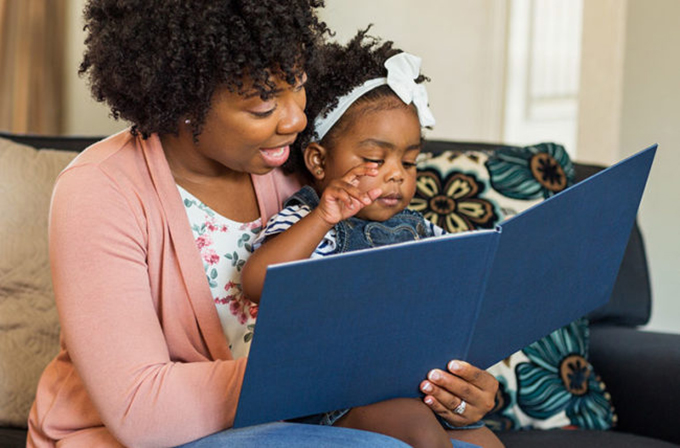
When practiced on a regular basis, reading has a number of cognitive and emotional benefits . Therefore, identifying the factors that promote this activity is of significant interest, in particular to allow the youngest to benefit as early as possible, and in a lasting way, from these benefits.
Among these factors, there is one that can have a particularly early effect on the taste for reading: the fact of reading stories to your child, which is also called shared reading.
Discover the “language of books”
Simple at first glance, this activity can nevertheless generate a strong experience. Let’s discover how Maryanne Wolf, professor of child development and cognitive neuroscience in the United States, describes with acuity and sensitivity the phenomenological dimension of this joint activity in the book Proust and the squid :
“Let’s imagine the next scene. A child is snuggled up to a loved one and listens intently to the spoken words flowing like a stream, words telling tales of fairies, dragons and giants living in distant lands never before imagined”.
According to the professor, the brain of the child to whom we read stories prepares to read much earlier than we might think. For example, the treatment of words like “elf” or expressions like “once upon a time”, which are rarely encountered in ordinary conversation, will familiarize the child at an early stage with the “language of books”.
Thus, the two activities that occur in parallel during shared reading, “hearing the written language and feeling a feeling of love”, would be “the best foundations of this long learning that no specialist in cognitive science or education cannot implement,” continues Maryanne Wolf.
Develop your oral and written language
Several studies have been conducted in recent decades to determine the effects of shared reading on child development. In a 2011 meta-analysis published in the scientific journal Psychological Bulletin , Suzanne Mol and Adriana Bus of Leiden University in the Netherlands listed them.
From the introduction of the article, it is indicated, with supporting references, that shared reading is considered to be one of the most important activities for the development of knowledge prior to subsequent success in reading. The establishment before the age of two of a habit of shared reading would expose the child to a variety of linguistic stimuli which stimulate the development of his language and lay the groundwork for a regular practice of reading.
Thus, children to whom stories have been read frequently enter school with a larger vocabulary and better comprehension skills. This significant effect could be explained, at least in part, by the fact that children’s books contain three times more infrequent words than television content or adult-child conversations according to Donald Hayes and Margaret Ahrens in an article published in Journal of Child Language in 1988 .
Moreover, a meta-analysis by Adriana Bus and her colleagues, published in 1995 in Review of Educational Research , already showed that 64% of children benefiting from shared reading were the best readers in school, this number dropping to 36% for children not benefiting from it. Thus, shared reading would have a significant impact on the development of children by promoting the skills needed to learn to read and by creating a positive attitude towards reading.
Thus, children to whom stories have been read frequently enter school with a larger vocabulary and better comprehension skills. This significant effect could be explained, at least in part, by the fact that children’s books contain three times more infrequent words than television content or adult-child conversations according to Donald Hayes and Margaret Ahrens in an article published in Journal of Child Language in 1988 .
Moreover, a meta-analysis by Adriana Bus and her colleagues, published in 1995 in Review of Educational Research , already showed that 64% of children benefiting from shared reading were the best readers in school, this number dropping to 36% for children not benefiting from it. Thus, shared reading would have a significant impact on the development of children by promoting the skills needed to learn to read and by creating a positive attitude towards reading.
Thus, children to whom stories have been read frequently enter school with a larger vocabulary and better comprehension skills. This significant effect could be explained, at least in part, by the fact that children’s books contain three times more infrequent words than television content or adult-child conversations according to Donald Hayes and Margaret Ahrens in an article published in Journal of Child Language in 1988 .
Moreover, a meta-analysis by Adriana Bus and her colleagues, published in 1995 in Review of Educational Research , already showed that 64% of children benefiting from shared reading were the best readers in school, this number dropping to 36% for children not benefiting from it. Thus, shared reading would have a significant impact on the development of children by promoting the skills needed to learn to read and by creating a positive attitude towards reading.
Author Bio: Frederic Bernard is a Lecturer in Neuropsychology at the University of Strasbourg
